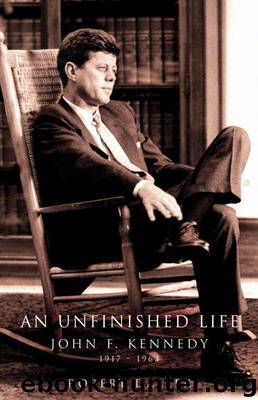An Unfinished Life: John F. Kennedy 1917-1963 by Robert Dallek

Author:Robert Dallek
Language: eng
Format: mobi, epub
Tags: Biography & Autobiography, Azizex666, Presidents & Heads of State
ISBN: 9780316172387
Publisher: Thorndike Press
Published: 2001-01-01T05:00:00+00:00
CHAPTER 12
Crisis Manager
When I ran for the Presidency of the United States, I knew that this country faced serious challenges, but I could not realize—nor could any man realize who does not bear the burdens of this office—how heavy and constant would be those burdens.
— John F. Kennedy, Report to the American People on the Berlin Crisis, July 25, 1961
LONDON WAS A WELCOME RESPITE from the tension of Vienna. Although Macmillan had initially been “appalled” that someone so young was president and had feared that Kennedy would see him as “so old that he wasn’t worthwhile talking to,” they had established an excellent rapport at two meetings in Washington during Kennedy’s first months in office. Macmillan’s intelligence and dry, quick wit had delighted the president. Going to see the prime minister was like being “in the bosom of the family,” Kennedy told Henry Brandon. “I am lucky to have a man to deal with with whom I have such a close understanding.” “It was the gay things that linked us together,” Macmillan told Schlesinger, “and made it possible for us to talk about the terrible things.”
Kennedy’s meeting with Khrushchev, Macmillan thought, had left JFK stunned. “For the first time in his life Kennedy met a man who was impervious to his charm.” The chairman was “much more of a barbarian” than he had anticipated. Because Kennedy seemed so tired, Macmillan suggested that they meet without Foreign Office officials—“a peaceful drink and chat by ourselves.” Kennedy was pleased at the suggestion, but their discussion was anything but relaxing. Khrushchev’s threats were impossible to ignore, and for the better part of an hour the two allies explored ideas on a formal response. They believed it essential to stand by what Kennedy had told Khrushchev: The Russians could do what they liked about a peace treaty with the DDR, but “the West stood on their rights and would meet any attack on these with all the force at their command.”
Kennedy returned to Washington on the morning of June 6. He met with congressional leaders that afternoon and spoke to the American people from the Oval Office at 7:00 P.M. He gave the sixteen Senate and House leaders a candid assessment of the talks, reading some excerpts from minutes of the meetings rather than simply giving them his gloss on what had occurred. He had no intention, he told the leaders, of saying anything “that would seem to put Khrushchev in a corner where he must fight back.” But he also wanted them to understand that the United States was competing with an adversary intent on world dominance. Kennedy believed the test ban talks were now pointless and hoped to end them while making Soviet responsibility for the failure clear. On Berlin, Kennedy said that the U.S. would not cede its rights of access. “The Soviets feel that our edge is gone on the nuclear side,” he added, meaning not that Moscow had greater nuclear might than the United States but that it doubted U.
Download
An Unfinished Life: John F. Kennedy 1917-1963 by Robert Dallek.epub
This site does not store any files on its server. We only index and link to content provided by other sites. Please contact the content providers to delete copyright contents if any and email us, we'll remove relevant links or contents immediately.
| U.K. Prime Ministers | U.S. Presidents |
Waking Up in Heaven: A True Story of Brokenness, Heaven, and Life Again by McVea Crystal & Tresniowski Alex(37811)
Empire of the Sikhs by Patwant Singh(23086)
We're Going to Need More Wine by Gabrielle Union(19046)
Hans Sturm: A Soldier's Odyssey on the Eastern Front by Gordon Williamson(18592)
Leonardo da Vinci by Walter Isaacson(13336)
The Radium Girls by Kate Moore(12028)
Tools of Titans by Timothy Ferriss(8396)
Educated by Tara Westover(8054)
How to Be a Bawse: A Guide to Conquering Life by Lilly Singh(7486)
Permanent Record by Edward Snowden(5847)
The Last Black Unicorn by Tiffany Haddish(5636)
The Rise and Fall of Senator Joe McCarthy by James Cross Giblin(5280)
Promise Me, Dad by Joe Biden(5153)
The Wind in My Hair by Masih Alinejad(5095)
A Higher Loyalty: Truth, Lies, and Leadership by James Comey(4964)
The Crown by Robert Lacey(4817)
The Iron Duke by The Iron Duke(4356)
Joan of Arc by Mary Gordon(4111)
Stalin by Stephen Kotkin(3966)
